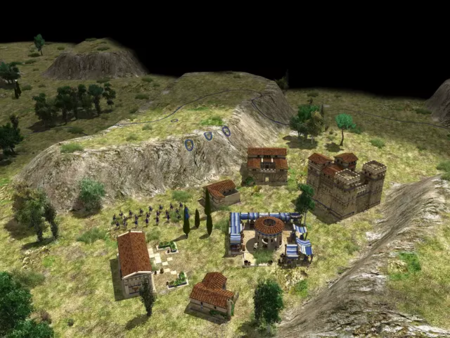Fog of war
(Military concept) | |
|---|---|
 The fog of war in a computer game as a dark area that limits the players view and that only can be cleared up when structures are built or characters are sent into it. | |
| Start | 1832 |
| The concept to describe uncertainty in war. | |
The fog of war is the uncertainty in situational awareness experienced by participants in military operations. The term seeks to capture the uncertainty regarding one's own capability, adversary capability, and adversary intent during an engagement, operation, or campaign. Military forces try to reduce the fog of war through military intelligence and friendly force tracking systems. In 2016, Chief of Staff of the United States Army Gen. Mark Milley stated that "On the future battlefield, if you stay in one place longer than two or three hours, you will be dead... With enemy drones and sensors constantly on the hunt for targets, there won't even be time for four hours' unbroken sleep."[1]
Etymology
The word "fog", but not the exact phrase, in reference to 'uncertainty in war' was introduced by the Prussian military analyst Carl von Clausewitz in his posthumously published book, Vom Kriege (1832), the English translation of which was published as On War (1873):
“War is the realm of uncertainty; three quarters of the factors on which action in war is based are wrapped in a fog of greater or lesser uncertainty. A sensitive and discriminating judgment is called for; a skilled intelligence to scent out the truth.”
Carl von Clausewitz (1873) [2]
It has been pointed out that von Clausewitz does not use the exact phrase "fog of war", and also uses multiple similar metaphors, such as "twilight" and "moonlight", to describe a 'lack of clarity'.[3] The first known use of the exact phrase in text dates to 1896 in a book titled The Fog of War by Sir Lonsdale Augustus Hale, where it is described as "the state of ignorance in which commanders frequently find themselves as regards the real strength and position, not only of their foes, but also of their friends."[4]
Problems
“It is not uncommon for opposing parties to a conflict to put forward competing narratives about a given event, with each side believing itself to be accurate, yet their respective facts and the conclusions derived therefrom failing to align. However, sometimes one or both parties have something that they want hidden, an uncomfortable reality that should, from their perspective, never see the light of day. In that case, the fog of war becomes a deliberate smokescreen designed to mislead and misdirect an audience so that the truth is never found out. If only one party is participating in such a deception, the fact will generally find a way to reveal itself. But if both parties are engaged in deliberate obfuscation, it becomes virtually impossible to find the truth.”
Scott Ritter (20 Oct, 2023) [5]
References
- ↑ https://breakingdefense.com/2016/10/miserable-disobedient-victorious-gen-milleys-future-us-soldier/
- ↑ http://slantchev.ucsd.edu/courses/ps143a/readings/Clausewitz%20-%20On%20War,%20Books%201%20and%208.pdf Vom Kriege, Book 1, Chapter 3
- ↑ On War Without the Fog, http://www.clausewitz.com/bibl/Kiesling-OnFog.pdf, Eugenia C. Kiesling, 2001, Military Review
- ↑ “The fog of war”, by Col. Lonsdale Hale, Royal Engineers (retired), Aldershot Military Academy, March 24, 1896.
- ↑ https://www.rt.com/news/585443-gaza-hospital-strike-truth/